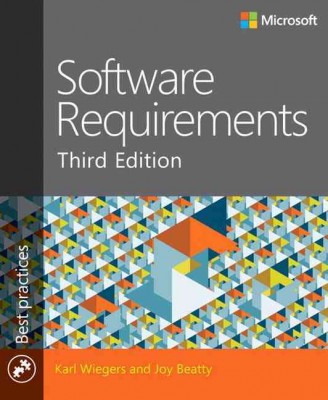| Software Requirements Revised Edition Contributor(s): Wiegers, Karl (Author), Beatty, Joy (Author) |
|
 |
ISBN: 0735679665 ISBN-13: 9780735679665 Publisher: Microsoft Press OUR PRICE: $44.99 Product Type: Paperback Published: August 2013 |
| Additional Information |
| BISAC Categories: - Computers | Software Development & Engineering - Project Management - Computers | Software Development & Engineering - Systems Analysis & Design - Computers | Programming - General |
| Dewey: 005.1 |
| Series: Developer Best Practices |
| Physical Information: 1.4" H x 7.4" W x 9.1" (2.50 lbs) 672 pages |
| Descriptions, Reviews, Etc. |
| Publisher Description: Now in its third edition, this classic guide to software requirements engineering has been fully updated with new topics, examples, and guidance. Two leaders in the requirements community have teamed up to deliver a contemporary set of practices covering the full range of requirements development and management activities on software projects.
New chapters are included on specifying data requirements, writing high-quality functional requirements, and requirements reuse. Considerable depth has been added on business requirements, elicitation techniques, and nonfunctional requirements. In addition, new chapters recommend effective requirements practices for various special project situations, including enhancement and replacement, packaged solutions, outsourced, business process automation, analytics and reporting, and embedded and other real-time systems projects. |